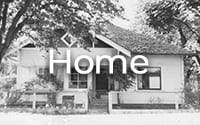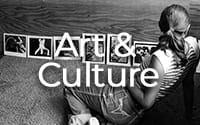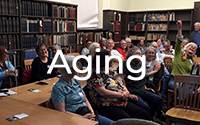COLLECTIVES, CO-OPS & ALTERNATIVE ECONOMIES
COLLECTIVES, CO-OPS & ALTERNATIVE ECONOMIES
Things were going to be different. While feminist utopian novels of the time offered captivating thought experiments in egalitarian living, the lesbians in Eugene put these ideas to the test and for many years enriched the city with their visionary and joyous collective and cooperative businesses.

“There were worker co-ops everywhere.”
– Myeba Mindlin –
Starflower
Founded by Margaret and Tom Cormier and Charlie and Debbie Glass, Starflower Natural Foods and Botanicals was a natural food distribution collective business operating in Eugene from 1973 – 1987. Starflower workers, nearly all lesbians, supplied grocery stores up and down the west coast. As truckers, warehouse workers, and office staff, they created a sucessful socialist business that anticipated the burgeoning popularity of natural foods.
Full Moon Rising
Full Moon Rising was an all-lesbian crew of the Hoedads worker-owned tree planting and forestry labor cooperative based in Eugene. They contracted with the Bureau of Land Managment and state forest services to replant trees after clearcut harvesting.
Special thanks and photo credit to Gladys Campbell for the use of her excellent photographs of the Full Moon Rising tree planting crew.
Mother Kali’s Bookstore
Mother Kali’s bookstore was a lesbian-owned and operated feminist bookstore that served as a hub for the Eugene lesbian community. It was housed in four different locations over thirty-three years.
Title image photo credit: Copyright Meadow Muska, All Rights Reserved
Other Collectives and Co-Ops
The Eugene lesbian community created and cultivated many innovative cooperatives such as Garbagio’s recycling, Crescent Construction, Energy Bank, Gertrude’s restaurant, Country VW car repair, and Amazon Kung Fu.
WORKING TOGETHER
As each young woman arrived in Eugene, she found her way to communal housing and collective work through the growing network of lesbians. Some first landed at Trudy’s Ranch or Fitch Camp in Lorane that offered cabins to traveling lesbians. Others found Mother Kali’s bookstore where a bulletin board advertised for lesbian housemates in houses clustered in the Whitaker neighborhood or off River Road in Eugene. Refusing to replicate the oppressive social systems they had left behind, they created and maintained an extraordinary array of innovative and successful collective lesbian-run businesses and cooperatives. These included pioneering services such as natural food distribution, garbage recycling, and feminist bookstores. Shut out from male-dominated areas of work, these defiant women created their own women-run construction, car repair, and tree-planting cooperatives. Many of these businesses showcased the women’s remarkable and effective political commitment to non-hierarchical, anti-patriarchal, and egalitarian practices and procedures. They experimented with equal pay scales across jobs, women-centered training, on-site child care, and sweat equity. They developed alterative economic relationships such as the Energy Bank where women bartered services and expertise. In their interviews, the narrators describe the challenges and the joys of working together to create a way of living that aligned with their feminist social and political visions.

GALLERY
Starflower Natural Foods and Botanicals
Full Moon Rising
Other Collectives, Co-Ops & Alternative Economies
FOR TEACHING AND RESEARCH
SPOTLIGHT: AMAZON KUNG FU
Linda McIntosh served as the head instructor at Amazon Kung Fu in the 1980s. She writes, “What made the martial arts training exciting and exceptional was the eventual realization of the tough spiritual and political questions asked by the martial arts practitioner. Who will we defend? How far can and will we go to fight for our ideals, principles and survival?”

Linda McIntosh of Amazon Kung Fu
Ideas
Visit the Eugene Lesbian Oral History Project archive to read Lorraine Ironplow’s remembrances of Mother Kali’s Bookstore matriarch Izzie Harbaugh.



















































































